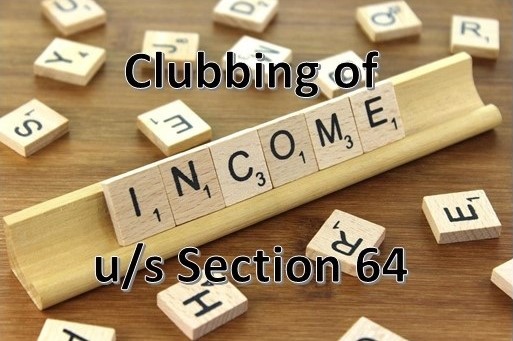Understanding the applicability of clubbing provisions in the income tax return of assesses is important to prevent tax avoidance. These provisions ensure that income is taxed in the hands of the real owner, even if the income is received by another person.
This blog post takes you deep into the understanding the sections relating to clubbing provisions of the Income Tax Act and the taxability of the same in the hands of the real owner.
What is the meaning of clubbing of income
Normally, a person is taxed in respect of income earned by him only. However, in certain special cases income of other person is included (i.e. clubbed) in the taxable income of the taxpayer and in such a case he will be liable to pay tax in respect of his income (if any) as well as income of other person too. The situation in which income of other person is included in the income of the taxpayer is called as clubbing of income. E.g., Income of minor child is clubbed with the income of his/her parent. Section 60 to 64 contains various provisions relating to clubbing of income.
Income of other person includible in Assessee’s Total Income
Transfer of Income without transfer of asset (Section 60)
(i) If any person transfers the income from any asset without transferring the asset itself, such income is to be included in the total income of the transferor.
(ii) It is immaterial whether the transfer is revocable or irrevocable and whether it was made before the commencement of this Act or after its commencement.
Example : Mr.X transferred has not transferred the house property to his wife Mrs.X but confers the right to received the rent in his wife’s name. In this case, the rent received by Mrs.X will be clubbed with the income of Mr.X
Income arising from revocable transfer of assets (Section 61)
All income arising to any person by virtue of a revocable transfer of assets shall be chargeable to income-tax as the income of the transferor and shall be included in his total income.
Meaning of revocable transfer [Section 63]
(a) a transfer shall be deemed to be revocable if—
(i) it contains any provision for the re-transfer directly or indirectly of the whole or any part of the income or assets to the transferor, or
(ii) it, in any way, gives the transferor a right to re-assume power directly or indirectly over the whole or any part of the income or assets ;
(b) “transfer” includes any settlement, trust, covenant, agreement or arrangement.
Exceptions where clubbing provisions are not attracted even in case of revocable transfer [Section 62]
1) The provisions of section 61 shall not apply to any income arising to any person by virtue of a transfer—
(i) by way of trust which is not revocable during the lifetime of the beneficiary, and, in the case of any other transfer, which is not revocable during the lifetime of the transferee; or
(ii) made before the 1st day of April, 1961, which is not revocable for a period exceeding six years :
Provided that the transferor derives no direct or indirect benefit from such income in either case.
(2) Notwithstanding anything contained in sub-section (1), all income arising to any person by virtue of any such transfer shall be chargeable to income-tax as the income of the transferor as and when the power to revoke the transfer arises, and shall then be included in his total income.
Income of other person includible in Individual’s Total Income
1. Clubbing of income arising to spouse
(I) Income by way of remuneration from a concern in which the Individual has substantial interest (Section 64(1)(ii))
Remuneration received in cash or kind to spouse from a concern in which the individual has a substantial interest is to be clubbed. This income will be clubbed in the hands of the either of the spouse if it is not received on account of professional or technical qualification.
If the income is received on account of the individual possessing the technical or professional qualification that income shall be solely attributable to the income of the assesse who possesses that qualification or skill.
Where both husband and wife have substantial interest in a concern and both are in receipt of income by way pf remuneration from the said concern, such income will be includible in the hands of that spouse whose total income excluding such income is higher.
Meaning of Substantial Interest:
Where the concern is a company – Equity shares carrying 20% or more of voting power is beneficially owned by such person or partly by such person and partly by one or more of his relatives at any time during the previous year.
In any other case – Such person or such person and one or more of his relatives are entitled in aggregate to received 20% or more of profit of such concern at any time during the previous year.
Note : Where any such income is once included in the total income of either spouse, income arising in the succeeding year shall not be included in the total income of the other spouse unless the officer is satisfied, after giving that spouse an opportunity of being heard, that it is necessary to do so.
(II) Income arising to spouse from an asset transferred without adequate consideration(Section 64(1)(iv))
Where the asset transferred is other than House Property from one spouse to other whether directly or indirectly, otherwise than for adequate consideration or with an agreement to live apart any income arising from transferred asset shall be included in the total income of the transferor spouse.
Where the asset transferred is House Property the provisions of section 27 will be applicable. If the transfer is otherwise than for adequate consideration or with an agreement to live apart, the transferor shall be deemed to be the owner of the house property and its income will be taxed in the hands of the transferor.
The income arising only on the transferred assets will be clubbed and the income earned by investing such income (arising from transferred asset) cannot be clubbed.
Where the asset transferred by the spouse is invested by the transferee in the business proportionate income arising to the transferee from such investment is to be included in the hands of the transferor.
If the investment is in the nature of capital contribution, proportionate interest receivable by the transferee from the firm will be clubbed with the income of the transferor.
Such proportionate has to be computed by taking into account the value aforesaid investment as on the first day of the previous year to the total investment in the business or by way of capital contribution in a firm or partner.
(III) Transfer of assets for the benefit of spouse (Section 64(1)(vii))
All income arising directly or indirectly to any person or association of persons from assets transferred directly or indirectly otherwise than for adequate consideration to the person or association of persons by such individual, to the extent to which the income from such assets is for the immediate or deferred benefit of his or her spouse.
2. Clubbing of income arising to son’s wife
(I) From assets transferred without adequate consideration by father-in-law or mother-in-law (Section 64(1)(vi))
An asset transferred directly or indirectly to his or her son’s wife without adequate consideration, the income arising from such asset is includible in the total income of the transferor.
Where the assets transferred directly or indirectly to his or her son’s wife are invested by the transferee in the business proportionate income arising to the transferee from such investment is to be included in the hands of the transferor.
If the investment is in the nature of capital contribution, proportionate interest receivable by the transferee from the firm will be clubbed with the income of the transferor.
Such proportionate has to be computed by taking into account the value aforesaid investment as on the first day of the previous year to the total investment in the business or by way of capital contribution in a firm or partner.
(II) Transfer of assets for the benefit of son’s wife (Section 64(1)(viii))
All income arising directly or indirectly to any person or association of persons from assets transferred directly or indirectly otherwise than for adequate consideration to the person or association of persons by such individual, to the extent to which the income from such assets is for the immediate or deferred benefit of his or her son’s wife.
3. Clubbing of minor’s income
- All the income earned by a minor is to be included in the income of his/her parent.
- However, any income derived by the minor from manual work or from any activity involving his/her skill, talent or specialized knowledge or experience will not be clubbed in the hands of the parent.
- The income of the minor will be clubbed in the hands of the parent whose total income is higher.
- Once the clubbing of minor’s income is done in the hands of that one parent, it will continue to be clubbed in that parent’s hands only in subsequent years also. The officer may club the minor’s income in the hands of the other parent, if after giving that other parent an opportunity to be heard, and the officer is satisfied that it is necessary to do so.
- If the marriage of the parents does not subsist, the income of the minor will be included in the hands of the parent who maintains the minor child in the relevant previous year.
- The income of a minor child suffering from any disability of the nature specified in section 80U shall not be included in the parents income but shall be assessed in the hands of the minor child.
- These provisions are applicable to married minor daughter also.
- In case of an asset transferred to minor child without adequate consideration or for inadequate consideration is a house property, as per provisions of section 27(i), the transferor parent will be the deemed owner of the said property. The income arising from such property will be included in the hands of the deemed owner (transferor parent). In this case the clubbing provisions will not be attracted and the benefit of exemption will not be available.
- If a house property is transferred to a minor married daughter without adequate consideration or for inadequate consideration the provisions of section 27(i) will not be attracted. The owner of the said property will be the minor child and the income arising from such property will be included in the hands of the either of the parents.
Exemption u/s 10(32) in the case of clubbed minor income
In the case of a minor income clubbed in the hands of the parent as per section 64(1A), such parent shall be entitled to an exemption of Rs.1,500 in respect of each minor child.
If the income of the minor child is less than Rs.1,500 then the entire income shall be exempt.
This exemption is not available to the parent if the parent chooses to opt the default tax regime under section 115BAC(1A).


